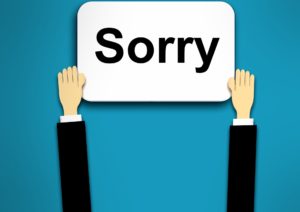
I’m back! I’m off to shul for Yom Kippur davening.
Somehow I managed to find a babysitter, and am able to join my older daughters and participate in the service.
Things have changed.
I am a parent.
I know my kids will be watching me.
Observing my intensity. Monitoring my commitment.
I’m going to let you into my secret.
I’m nervous about the authenticity of klopping al chet in the presence of my emotionally attuned children.
I aspire to teach my children to take personal responsibility for their actions and to apologize with intent.
This Yom Kippur, I have a strategy for teaching my kids how to klop al chet.
First Teach Yourself
As a parent, I want to influence and inspire my children.
Children can’t be lectured how to sincerely apologize.
Children have to be a witness to my process.
Children need to see and feel, and be taught the right words.
My kids need to witness my struggle.
My kids need to witness my humility.
Why is it so hard to say “I’m sorry”?
By saying “I’m sorry” my imperfections are highlighted.
I feel vulnerable.
I feel ashamed.
I feel a loss of control.
Through watching me, my children will learn.
Intention
How many times (a day!) have I begged my kids to apologize.
“Just say you’re sorry!”
No!
It doesn’t work that way!
What does “I’m Sorry” really mean?
-
- My actions caused harm
-
- I take full responsibility for my actions and their effects
- I will make appropriate corrections
An apology is a declaration.
-
- I promise to try my best
- I will not repeat my mistake
An apology comes from the heart, with words full of intent – kavanah.
Guide
Can children actually have kavanah when apologizing?
Children are born with the capacity for empathy, understanding, and love.
Sometimes, they struggle with meeting my parental expectations and navigating social norms.
Sometimes, they struggle with recognizing the extent of their mistake and the hurt they caused another.
Sometimes, they struggle with translating these feelings into a genuine willingness to make amends.
I am their guide for mediation.
I am their guide to reconciliation.
I am their guide to the art of compromise.
Empower Them
Apologizing is a choice.
I choose when to apologize.
My children deserve that same option.
I want my kids to apologize with kavanah.
I hope to empower them to decide when an apology is necessary.
Yom Kippur Community
Why do we klop al chet individually and communally on Yom Kippur?
As I look around, I realize that I am not alone.
We are all trying to improve ourselves.
Children, we are on this journey together as individuals and as a community.
Apologizing is hard work.

The Golden Rule
מה ששנוא עליך אל תעשה לחברך שבת ל”א, ע”א
“What is hateful to you, do not do to your friend”
Would you like if someone threw your toy over the fence?
Would you feel sad if someone didn’t save you a seat on the bus?
Would you like it if your friend gossiped about you on social media?
Treat others in the way you wish to be treated.
Let’s strive for ואהבת לרעך כמוך–
Love Your Neighbor As You Love Yourself.
This is what my children need to see and to hear.
Again and Again.
Growth not Perfection
I wasn’t perfect last year. Probably, I won’t be perfect this year.
Luckily, Judaism saves perfection for angels.
Humans can grow.
Before entering a new year, during Aseret Yemei Teshuva, I go through the process of self-improvement.
The blasts of the shofar on Rosh Hashanah take me back to the past year.
Offering a chance to reflect on my actions.
Was I a good friend?
Could I have been a more patient mother?
Maybe I should have refrained from repeating that story?
The teshuva process is completed as I stand on Yom Kippur and beat my chest in authentic confession.
Now, the new year can start!
Through this humbling process, I gain insight into my behavior, and I can use the past as an opportunity for future growth.
Without any explicit instructions, my children will hopefully be inspired.
Inspired to discover who they are.
Accept that mistakes will be made.
Confident to recognize them as opportunities for growth.
My 5778 Yom Kippur Resolutions
Pay attention to my interactions with my kids.
When I’m wrong, make an effort to apologize with Kavana to my kids.
I’m not going to force my kids to say, “I’m Sorry”.
Let them make the decision when to apologize.
Ask them questions.
Help them analyze their feelings and understand the root of the problem.
Encourage them to put themselves in the other person’s place.
Remind them that an apology is a promise to not repeat the offense.
In the merit of apologies from the heart, may we all be blessed with the capacity to forgive ourselves and one another.
What are your tips for teaching your kids to apologize?
Yocheved Pianko Feinerman is “leaning in” and embracing the harmony and chaos of raising four “spirited” children, juggling an active career as an educator, and writer while planning the next 24-hour getaway with her husband.
Facebook https://www.facebook.com/highenergymom, Instagram http://www.instagram.com/highenergymom and Twitter
http://www.twitter.com/highenergymom1.
(Originally posted in the Times of Israel on September 26
http://blogs.timesofisrael.com/5778-the-year-i-will-teach-my-kids-to-klop-al-chet/


Leave a Reply